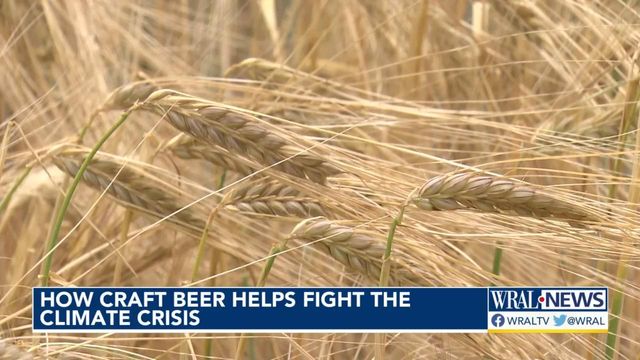From planting to malt preparation, local companies work to reduce CO2 in producing your favorite brew
According to the Environmental Protection Agency, agriculture produces 10 percent of the U.S. greenhouse gas emissions. Farmers at Perry Farms and malt masters at Epiphany Craft Malt are working to bring that number down. They are altering their farming practices, sourcing locally and looking at ways to go carbon-neutral.
Posted — UpdatedA local farm and malting company are teaming up to reduce greenhouse gasses in the production of the nation's popular alcoholic beverage.
They are starting with that process out on the farm.
“Nitrogen fertilizer comes from fossil fuels and is by far the biggest piece of the CO2 emissions that we as a malt house create from growing the grain to malting it," said Sebastian Wolfram, founder and director of malting and roasting operations with Epiphany Craft Malt. "So, getting rid of that will wipe out 40 to 50 percent of our CO2 footprint as a business right away.”
That is why they source their barley grains, a key ingredient for making beer, from Perry Farms.
“What we do is for the long haul,” said Tim Kuhls, farmer at Perry Farms.
He said the farm is moving away from industrial farming and instead using an old-school planting and harvesting method that is less disruptive and more sustainable. It’s called carbon sequestration.
“We’ve seen farmland that hasn’t been under water since Hurricane Hazel. On a random weekday afternoon, we get so much rain that it will induce a flood and cause problems for everything we do here on the farm,” said Kuhls.
Lack of cold winter days could lead to more insects. “Those days of freeze that are missing – that are just cold – lead to more and more insects in the field, and when they get harvested, they stick around going to the bin. Over the winter, when we get the crop for malting more and more, we have to clean better and manage those pests. They eat up the grain. We don’t want them here. Our customers don’t want them,” said Wolfram.
Some of the breweries Epiphany works with are Fullsteam Brewery in Durham and Trophy Brewing in Raleigh.
Related Topics
• Credits
Copyright 2024 by Capitol Broadcasting Company. All rights reserved. This material may not be published, broadcast, rewritten or redistributed.






